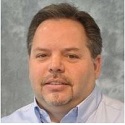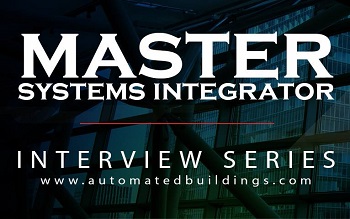 EMAIL
INTERVIEW
– Scott Cochrane and David
Crosley
EMAIL
INTERVIEW
– Scott Cochrane and David
Crosley|
December 2018 |
[an error occurred while processing this directive] |
| |
 EMAIL
INTERVIEW
– Scott Cochrane and David
Crosley
EMAIL
INTERVIEW
– Scott Cochrane and David
Crosley
Scott Cochrane is President and CEO of Cochrane Supply & Engineering, a leading industrial IoT and building controls suppliers with locations throughout Michigan, Ohio, and Kentucky, as well as President of Canada Controls. In 2000, Scott took over the business from his father, Donald Cochrane, Sr., who founded the company 50 years ago. He is proud to be an advisory council member for multiple industry manufacturers such as Honeywell, Johnson Controls, and Tridium, and to be named a 2016 IBcon Digital Impact Award Winner for his innovative contributions to the industry.

David Crosley is
General Manager of Waibel Energy Systems.
Dave has been in the HVAC industry for more than 30 years, with
technical experience in large industrial chiller plants, building
automation and energy management. Founded as Dayton Trane in 1989,
Waibel Energy Systems, and their network of partners through their
BuildingLogix distribution network specializes in Mechanical, Building
Automation, and Energy Saving services, equipment, solutions, and
training throughout the United States and Canada.

| Articles |
| Interviews |
| Releases |
| New Products |
| Reviews |
| [an error occurred while processing this directive] |
| Editorial |
| Events |
| Sponsors |
| Site Search |
| Newsletters |
| [an error occurred while processing this directive] |
| Archives |
| Past Issues |
| Home |
| Editors |
| eDucation |
| [an error occurred while processing this directive] |
| Training |
| Links |
| Software |
| Subscribe |
| [an error occurred while processing this directive] |
Scott Cochrane of Cochrane Supply & Engineering has the unique benefit of working with 300+ of the best systems integrators in the country. Cochrane recognizes the critical role they have within the building automation industry and is speaking with a different highly-regarded MSI each month with the goal of providing examples of industry trends, best business practices, and the growing value of an MSI. This month, he interviews David Crosley, General Manager, Waibel Energy Systems.
November Interview with Derek
Drayer of RoviSys. October
Interview with Preston
Blackwell of Enervise. September
Interview with Tom
Davis of ERMCO, Inc.
August 18 Interview with Continual Energy Inc
July Interview with Ian Morse, Division Manager, Building Automation Systems, Conti Corporation
June
Interview with Marc Dugré,
President of Regulvar, Inc.
May
Interview with Rick
Gorka, President of the Airon Group of Companies
April Interview with Colin M. Murray, Owner of Solution Control Services
February Interview with Jeff Murphy, President and CEO of ECT Services, Inc.
January 18 Interview with Chris Saltz, Managing Principal of FIX Consulting LLC.
December Interview with Jason Houck from Hepta Control Systems.
November Interview with Geoff Hunter, President and Senior Principal of Palmer Conservation Consulting (PCC)
October Interview with Brian Oswald, Managing Director for CBRE | ESI.
September
Interview with Joe
Napieralski the Co-Founder and Director of Development of Smart
Building Services LLC
August Interview with Sidney
H. Blomberg, Jr. the founder and President of K
& S Ventures, Inc
July 17 Interview with Scott
Cochrane and Ken Sinclair
This month (December/18) he
interviews David
Crosley, General Manager of Waibel
Energy Systems.
Cochrane:
How did you become an MSI?
Crosley:
Our first MSI job came in on a fax machine. It was a school
district that was in the early stages of a major construction project
of nine new buildings. They challenged us to tie the systems in their
existing schools together with the new buildings being built. The
building projects although being managed by one construction Management
Company was being bid in phases by multiple HVAC equipment Vendors and
Control Contractors. We presented the concept of the MSI, where
for a percentage of each project, we would do all of the integration
graphics and put up the front end for them. They were asking,
well how much does that cost? We said it’s about 20% of the control
project. So we got POs whenever control projects came in, for 20% of
the project price.
Cochrane:
Can you explain what some of the characteristics are of a
good MSI?
Crosley:
Calm. Extremely good looking and
athletic. But really, you
have to have a diverse team with knowledge of different vendors,
different products, and different technologies. And you need good
project management.
Cochrane:
How do you sell Master Systems Integration services?
Crosley:
I would say a lot of them are design-build projects going in,
where school districts or companies have multiple vendors and control
contractors that they have worked with and are frustrated by, for
various reasons. Clients want to be able to pull their systems all
together so they can be fully utilized and managed instead of being
locked down and seen as a mystery to them. We then really work with
folks on what we call performance service agreements together. So we’re
doing it over a period of time so that instead of doing it as a
project, we provide it as a managed service.
Cochrane:
How do your customers procure MSI services?
Crosley:
Being an MSI is a more of a service than a project. They buy
it from us like a typical service agreement. So in other words, over a
period of several years, we manage their systems, and the goal is to
leave them with the latest and greatest hardware and software
versions/revisions that we can by the end of the agreement. We cover
everything, do full maintenance, manage it and replace it just in time
before failure so that way at the end of the contract they are in good
shape. Hopefully, by delivering true value, we can roll into another
Multi Service agreement.
[an error occurred while processing this directive]Cochrane:
As an MSI, what percent of your time is spent in the
following categories? R&D, Consultations, Field Commissioning, and
Software Programming.
Crosley:
Cochrane:
Describe a few challenges that you’ve encountered as an MSI.
Crosley:
Our biggest challenges are time and money as well as
resources. In the beginning, it was an uphill battle getting people to
accept it, but I think it’s more than just accepting of it when it
comes to this concept, it’s expected now. It’s expected that you can
handle the different systems. It’s kind of a like a cell phone. People
need phones on them 24 hours a day and you better not take it away,
it’s expected. If you’re going to be in my building, you better be able
to handle all these things. And I think that’s the shift from the
facility manager mentality to the IT manager mentality.
Cochrane:
Do you envision Master Systems Integration being a part of
your business in the future? If so, how?
Crosley:
I see more opportunity for the managed services piece of it
than just the projects. People are less interested in buying product
and more interested in buying the service, the subscription-based model
type of thing. They want be taken care of. They don’t really care about
what JACE version they have, what controller they have or what brand or
anything like that, they just want to make sure that in five years they
aren’t going to get stuck with a hardware or software that they spent a
ton of capital dollars on.
[an error occurred while processing this directive]
[Click Banner To Learn More]
[Home Page] [The Automator] [About] [Subscribe ] [Contact Us]